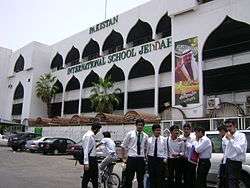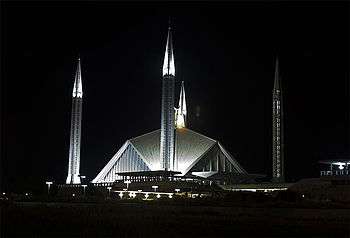Pakistan–Saudi Arabia relations
 | |
Pakistan |
Saudi Arabia |
|---|---|
The bilateral relations between the Islamic Republic of Pakistan and the Kingdom of Saudi Arabia (Arabic: العلاقات السعودية الباكستانية, Urdu: پاک سعودی عرب تعلقات) are historically close and extremely friendly, frequently described by analysts as constituting a special relationship.[1][2][3] Pakistan has been called "Saudi Arabia's closest Muslim ally."[4]
Brief history
Saudi Arabia and Pakistan have sought to develop extensive commercial, cultural, religious, political, and strategic relations since the establishment of Pakistan in 1947. Pakistan affirms its relationship with Saudi Arabia as their most "important and bilateral partnership" in the current foreign policy of Pakistan, working and seeking to develop closer bilateral ties with Saudi Arabia, the largest country on the Arabian peninsula and host to the two holiest cities of Islam, Mecca and Medina and the destination of Muslim pilgrims from across the world.
According to a Pew Research Center survey, Pakistanis hold the most favorable perception of the desert kingdom in the world, with 95 percent of respondents viewing Saudi Arabia favorably.[5] With one of the largest armies in the world and as the only declared nuclear power among the Muslim states, Pakistan has maintained a unique position to assist Saudi Arabia with its defense needs. The BBC claimed in 2013 that Saudi Arabia has invested in Pakistan’s nuclear weapons projects. Both Pakistan and Saudi Arabia publicly denied the report.[6] The kingdom has often tried to woo Pakistan by giving it gifts and loans, often these are gifts with symbolic religious value, for example in 2014 it gifted Pakistan 200 tonnes of dates.[7] Pakistani commandos ended the Grand Mosque Seizure in 1979, and restored Saudi administration over the Masjid al-Haram.[8]
Pakistan’s previous Prime Minister Nawaz Sharif enjoys exceptionally close ties with senior members of the Saudi royal family. When Sharif was toppled in the bloodless 1999 Pakistani coup d'état, Saudi Arabia intervened; and military chief Pervez Musharraf allowed Sharif and his family to travel into exile in Saudi Arabia. On 2 April 2014, Pakistan Today reported that Pakistan will sell JF-17 Thunder jets to Saudi Arabia, after the kingdom had given a grant of $1.5 billion to Pakistan in early 2014.[9][10] On January 8, 2014, Al-Monitor reported that the partnership with Pakistan satisfies the Saudi historic quest for a close non-Arab ally to maintain its hegemony in the Arab world and deal with its own internal security challenges. Saudi Arabia is often seen offering its economic resources and the promise of investment in return for military and security cooperation from Pakistan.[11]
Development of bilateral relations between the two countries

Saudi Arabia and Pakistan are leading members of the Organisation of Islamic Cooperation (OIC). Saudi Arabia is one of the strongest supporters of Pakistan during Pakistan's wars with India, especially opposing the creation of Bangladesh from Pakistan's eastern wing in 1971.
Saudi Arabia supports Pakistan's stance on the Kashmir conflict, and endorses the Pakistani position in the Indo-Pakistani peace process. With Pakistan, it provided extensive financial and political support to the Taliban and the Afghan mujahideen fighting the Soviet invasion of Afghanistan in the 1980s.[12][13][14] During the 1990-1991 Persian Gulf War, Pakistan sent troops to protect the Islamic holy sites in Saudi Arabia, but strains developed when some Pakistani politicians and Gen. Mirza Aslam Beg, the then-chief of staff of the Pakistani army openly expressed support for Saddam Hussein's regime in Iraq and its invasion of Kuwait.[15] Along with the United Arab Emirates, Saudi Arabia and Pakistan were the only states to recognise Taliban rule in Afghanistan. In May 1998, Saudi Arabia was the only country that was taken in complete confidence by Prime minister Nawaz Sharif on Pakistan's decision on performing atomic test in Weapon-testing laboratories-III (WTL-III) in the region of the Chagai Hills. After he ordered the atomic tests (see codenames: Chagai-I and Chagai-II), Saudi Arabia, along with United Arab Emirates, were the only countries to backed Pakistan and congratulated the country for making the "bold decision". Furthermore, Saudi Arabia promised to supply 50,000 barrels per day of free oil to help Pakistan cope with likely economic sanctions in the aftermath
Military cooperation
Pakistan maintains close military ties with Saudi Arabia, providing extensive support, arms and training for the Saudi Arabian military.[13] Fighter Pilots of the Pakistan Air Force flew aircraft of the Royal Saudi Air Force to repel an incursion from South Yemen in 1969. In the 1970s and 1980s, approximately ~15,000 Pakistani soldiers were stationed in the kingdom.[13] Saudi Arabia has negotiated the purchase of Pakistani ballistic missiles capable of carrying nuclear warheads.[13] It is also speculated that Saudi Arabia secretly funded Pakistan's atomic bomb programme and seeks to purchase atomic weapons from Pakistan to enable it to counteract possible threats from arsenals of the weapons of mass destruction possessed by Iran, Iraq and Israel.[16][17][18] Both nations have received high-level delegations of scientists, government and Saudi military experts of seeking to study the development of a Saudi nuclear programme.[13][16][19]
According to Bruno Tertrais, a researcher for the EU Non-Proliferation Consortium, during informal discussions held in 2005 a former Pakistan National Command Authority officials have said that deploying Pakistan nuclear warheads in Saudi Arabia would be "worse than the Cuban missile crisis." Tertrais concludes that there is no hard evidence in the public domain of any nuclear cooperation between the two countries.[20]
Cultural and commercial ties

Saudi Arabia has also provided extensive religious and educational aid to Pakistan, being a major contributor to the construction of mosques and madrassas (religious schools) across Pakistan, including the Faisal Mosque in Islamabad, named after King Faisal of Saudi Arabia. Since 1980, the number of religious schools increased from 800 to 27000 in 1997 and all are funded by Saudi Arabia. The schools serve as nurseries for teenagers and younger children (giving religious and moral education) from Pakistan, Syria, Afghanistan, Iran, Russia, Yemen etc.
Since 1947, the political parties have been receiving funding for their political activities in the country. The major Pakistani city of Lyallpur was also renamed Faisalabad in honour of King Faisal in 1977. Saudi Arabia remains a major destination for immigration amongst Pakistanis, the number of whom living in Saudi Arabia stands between 900,000 and 1 million (see Pakistanis in Saudi Arabia).[22][23] Saudi Arabia was a major supporter of the "Islamisation" programme of the military ruler Gen. Zia-ul-Haq in the 1970s. In 2006, King Abdullah of Saudi Arabia was awarded the Nishan-e-Pakistan, the highest civilian decoration of Pakistan.[24]
Saudi Arabia is the largest source of petroleum for Pakistan.[25] It also supplies extensive financial aid to Pakistan and remittance from Pakistani migrants in Saudi Arabia is also a major source of foreign currency for Pakistan.[26] In recent years, both countries have exchanged high-level delegations and developed plans to expand bilateral cooperation in trade, education, real estate, tourism, information technology, communications and agriculture.[23][27] Saudi Arabia is aiding the development of trade relations with Pakistan through the Gulf Cooperation Council, with which Pakistan is negotiating a free trade agreement; the volume of trade between Pakistan and GCC member states in 2006 stood at USD 11 billion.[26][27] Financial co-operation includes $3 billion in aid and loans, of which $1.5 billion was deposited in Pakistan's central bank.[28]
See also
References
- ↑ Cafiero, Giorgio; Wagner, Daniel (23 November 2015). "Saudi Arabia and Pakistan’s Evolving Alliance". Huffington Post. Retrieved 27 January 2016.
- ↑ Guzansky, Yoel (16 February 2016). "Pakistan and Saudi Arabia: How Special are the “Special Relations”?". The Institute for National Security Studies. Retrieved 27 January 2016.
- ↑ Teller, Neville (2016). The Chaos in the Middle East: 2014-2016. Troubador Publishing Ltd. p. 246. ISBN 9781785892820.
- ↑ Lacey, Robert (2009). Inside the Kingdom : Kings, Clerics, Modernists, Terrorists, and the Struggle for Saudi Arabia. Viking. p. 294.
Saudi Arabia's closest Muslim ally, Pakistan
- ↑ Saudi Arabia’s Image Falters among Middle East Neighbors Pew Research Global Attitudes Project
- ↑ Saudi-Pakistan Military Ties Getting Stronger
- ↑ Grand gesture: Saudi Arabia gifts 200 tons of dates to Pakistan
- ↑ see also Prouteau, Christian (1998). Mémoires d'Etat. Michel Lafon. p. 265 through 277 and 280.
- ↑ Pakistan to return Saudi favor with arms, combat aircrafts [sic]
- ↑ Reavealed [sic]: It was Saudi Arabia that loaned Pakistan $1.5 billion to shore up reserves
- ↑ Saudi strategy includes alliance with Pakistan
- ↑ Dr. Veena Kukreja, Mahendra Prasad Singh (2005). Pakistan: Democracy, Development and Security Issues. Sage Publications. p. 248. ISBN 0-7619-3417-0.
- 1 2 3 4 5 Saudi Arabia: Nervously Watching Pakistan
- ↑ Prithvi Ram Mudiam (1994). India and the Middle East. British Academic Press. pp. 88–94. ISBN 1-85043-703-3.
- ↑ Pakistan - Middle East
- 1 2 Al J. Venter (2007). Allah's Bomb: The Islamic Quest for Nuclear Weapons. Globe Pequot. pp. 150–53. ISBN 1-59921-205-6.
- ↑ Saudi Arabia's nuclear gambit
- ↑ Saudi Arabia Special Wars
- ↑ Saudis consider nuclear bomb
- ↑ Tertrais, Bruno (July 2012). "Pakistan's Nuclear and WMD Programmes: Status, Evolution and Risks" (PDF). Non-Proliferation Papers. EU Non-Proliferation Consortium (19): 16. Retrieved 19 April 2013.
- ↑ Mass, Leslie Noyes (2011). Back to Pakistan: A Fifty-Year Journey. Rowman & Littlefield. p. 157. ISBN 978-1-4422-1319-7.
- ↑ Arab versus Asian migrant workers in the GCC countries
- 1 2 Riyadh look to Asian trade
- ↑ King Abdullah ends Asian tour with state visit to Pakistan
- ↑ Saudi king holds Pakistan talks
- 1 2 India-Pakistan trade with Gulf hits $36 bn
- 1 2 Pakistan to welcome greater investment from Saudi Arabia Archived 2008-06-13 at the Wayback Machine.
- ↑ https://www.reuters.com/article/us-pakistan-saudi-idUSBREA2C13G20140313

